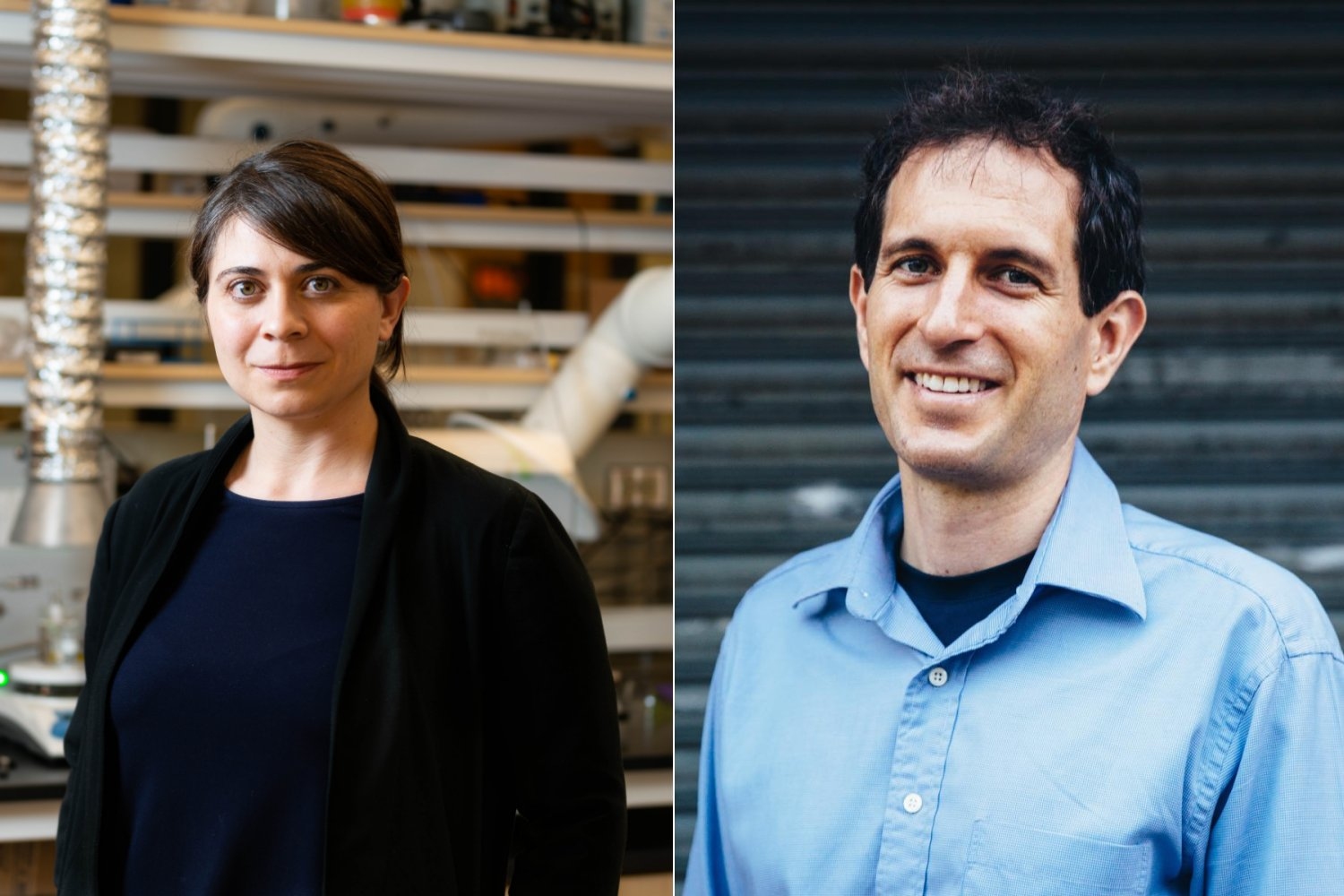Desirée Plata and Justin Steil win Edgerton Faculty Award
CEE and DUSP faculty members recognized for excellence in leadership, service, and impactful work tackling environmental and social justice issues.

MIT associate professors Desirée Plata and Justin Steil have been named recipients of the 2020-21 Harold E. Edgerton Faculty Achievement Award. The award’s selection committee chose to recognize both faculty members for their excellence in service, mentorship, and research that impacts critical societal challenges in environmental sustainability and social justice.
The annual Edgerton Faculty Award was established in 1982 as a tribute to Institute Professor Emeritus Harold E. Edgerton in recognition of his active support of junior faculty members. Each year, a committee presents the award to one or more non-tenured faculty members to recognize exceptional contributions in research, teaching, and service.
The award, announced at today’s MIT faculty meeting, lauds Plata for “her innovative approach to environmentally sustainable industrial practices; her inspirational teaching and mentoring; and her service to the Institute, the Commonwealth, and her professional community.” The selection committee commends Steil for “his tremendous dedication to building institutions to remediate social injustice and relieve suffering by doing so; his deep commitment to creative ways of teaching his students how to do similar work; and his service record that is without equal.”
Plata, the Gilbert W. Winslow (1937) Career Development Associate Professor in Civil Engineering, focuses her research on making industrial processes more environmentally sustainable for the health and betterment of society. Her proactive environmental engineering approach is changing the way people invent materials and processes — to incorporate environmental objectives into the design phase to avoid environmental damage. “Her work is leading environmental chemistry away from the clean-up mode of environmental protection and toward smart and sustainable innovation that aims to prevent future negative impacts on the environment,” stated the selection committee in their report. In the domain of hydraulic fracturing and unconventional drilling, the committee noted, “she has provided perhaps the most complete and best-grounded study of potential water-quality impacts from this technology and is publishing geospatially-referenced guidance for avoiding compromising chemical reaction.” In addition, Plata’s contributions to carbon nanotube manufacturing for the mitigation of waste product formation, and enhanced growth of desired carbon nanotube products, resulted in two patents.
Steil, Class of 1942 Career Development Associate Professor of Law and Urban Planning, examines the intersection of urban policy with property, land use, and civil rights law. His recent research has explored the relationship between space, power, and inequality in the context of environmental justice, mass incarceration, immigration federalism, lending discrimination, and housing policy. The selection committee commended Steil’s influential research in fair housing and preserving civil rights: “fifty-seven cities, counties, civil rights, and fair housing organizations across the US cited his research in comments to the Department of Housing and Urban Development regarding HUD’s suspension of the Affirmatively Furthering Fair Housing Rule, and the Attorneys General of 22 states cited his research in comments regarding HUD’s efforts to change a key anti-discrimination tool provided under the Fair Housing Act.”
Both Plata and Steil are pioneering leaders in their fields and within their teaching styles through shaping students’ learning with real-world problems they can address in and outside of the classroom.
Steil’s highly-rated, innovative teaching style has connected students with local groups working on urban environmental hazards; with regional leaders involved in making and implementing policy regarding immigrants; and with students of urban sociology who are incarcerated, to explore issues such as processes by which urban inequality is created and reproduced. The students in the Department of Urban Studies and Planning awarded him the Student Council’s Excellence in Teaching Award, and the Office of Graduate Education’s Committed to Caring Award.
“Professor Steil far surpasses any reasonable bar for ‘exceptional distinction in teaching, in research, and in service.’ Indeed, he is redefining these terms for us all,” one senior colleague wrote in a nomination.
Plata’s colleagues and students admire her clear, approachable, enthusiastic style as a teacher and mentor, who is committed to ensuring her students’ success. “She is one of the most remarkable individuals I have encountered in my years at MIT, and an exemplary member of our faculty,” one senior faculty colleague wrote in a nomination. A former student praises, “she leads by example and bestows confidence in those she mentors,” the selection committee stated.
The committee acknowledged both faculty members' outstanding dedication to service. At MIT, Plata has helped in the development of educational materials for the Environmental Solutions Initiative. She’s also on the faculty steering committee for the MIT Climate and Sustainability Consortium. Outside the Institute, she is a member of the Commonwealth of Massachusetts Decarbonization Academic Steering Committee, which has been commissioned to inform strategies for 80 percent emissions reductions by 2050. She is also an associate editor of the Royal Society of Chemistry journal Environmental Science: Processes and Impacts, and has served as session chair and organizer for several Gordon Research Conferences on Environmental Nanotechnology and one on Environmental Sciences: Water.
Steil is an active and valued member of the Academic and Organizational Relationships Working Group of MIT’s response to the National Academies of Sciences, Engineering, and Medicine report on the sexual harassment of women, and also of the Committee on Sexual Misconduct Prevention and Response. Outside the Institute, Steil is a member of the Mayor of Boston’s Housing Advisory Task Force, and a board member of the Inter-University Committee on International Migration, and the Poverty and Race Research Action Council. In 2018, he received the inaugural MIT Paul Gray Award for Public Service, and in 2019 the International Municipal Lawyers Association’s Amicus Service Award.
Steil received a BA in African-American studies from Harvard University; an MS in city design and social science from the London School of Economics and Political Science; a JD from the Columbia University School of Law; and a PhD in urban planning from Columbia University. Before coming to MIT, Justin was a fellow at the Furman Center for Real Estate and Urban Policy at New York University Law School. Steil joined the MIT Department of Urban Studies and Planning in 2015. He was promoted to associate professor without tenure in 2018. He is also the co-editor of three books on the topics of fair housing and social justice.
Plata received a bachelor’s degree in chemistry from Union College and PhD in chemical oceanography and environmental chemistry from the MIT and Woods Hole Oceanographic Institution Joint Program. After receiving her doctorate, Plata held positions at Mount Holyoke College, Duke University, and Yale University. She joined the MIT faculty in 2018 as an assistant professor in the Department of Civil and Environmental Engineering. She was promoted to associate professor without tenure in 2020. She is also co-founder of Nth Cycle, maker of recycling technology for clean energy products.
Her other career honors include an NSF CAREER award, an Odebrecht-Braskem Sustainable Innovation Award, a two-time National Academy of Engineers Frontiers of Engineering Fellow, a two-time National Academy of Sciences Kavli Frontiers of Science Fellow, a Caltech Resnick Sustainability Fellow, and MIT’s Junior Bose Teaching Award.
The 2020-21 Edgerton Award Selection Committee was chaired by Professor Bevin Engelward in the Department of Biological Engineering. Committee members included Alessandro Bonatti, associate professor in MIT Sloan School of Management, Amy Glasmeier, professor in the Department of Urban Studies and Planning, Tim Swager, the John D. MacArthur Professor of Chemistry, and T.L. Taylor, professor of comparative media studies.





































